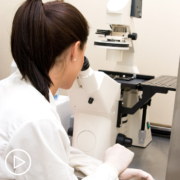Tag Archive for: tissue bank
Expert Advice for Patients With Small Cell Lung Cancer
Expert Advice for Patients With Small Cell Lung Cancer from Patient Empowerment Network on Vimeo.
Dr. Triparna Sen, a leading small cell lung cancer (SCLC) researcher and expert, shares key advice for patients. Dr. Sen stresses the importance of working closely with your doctor, asking about clinical trials options, and the benefits of support groups.
Dr. Triparna Sen is an associate professor in the department of oncological sciences and co-director of the Lung Cancer PDX Platform at the Icahn School of Medicine at Mount Sinai in New York. Learn more about Dr. Sen.
See More from Thrive Small Cell Lung Cancer
Related Resources:

|

Advances in Small Cell Lung Cancer Research | Hope for the Future |

|
Transcript:
Katherine:
What three key pieces of advice would you have for a patient who has just been diagnosed with small cell lung cancer?
Dr. Sen:
First of all, I would like to say definitely, definitely work with your physician. They are trying to do their best for you. Work with your physician. Follow the treatment regimen that they give. Ask about clinical trials that you are eligible for and that you can enroll into. Then, of course, having a support group. So, there are many patient advocacy groups right now for non-small cell and small cell lung cancer.
I think being a part of such a patient advocacy group where you have people going through the same journey, I think, it really helps. It helps you sort of manage your disease better. It helps you stay hopeful when you hear about other people’s sort of prognosis and if they have durable benefits from drugs. So, I think having a support group is very important. If there is an ability for you to contribute to research in terms of giving blood or tissues, if your physician is saying that you could be eligible for that, I think a contribution to research is really key.
Because looking at the disease mechanisms in the clinical tissue is sort of where for us it is absolutely golden. We go there. We look at the disease mechanisms and tissues. If there is an opportunity for you, then I think it should definitely be explored.
Finally, I would like to say we are really trying as researchers to really understand the disease better. We’re trying to do that better. I hope and I pray that we go faster with it. But I think there is hope right now for patients with small cell lung cancer. The research is really progressing better. There are many clinical trials.
So, I think stay hopeful and have a peer support group who can take you through this quite difficult journey.
Katherine:
Why should patients consider consulting with a lung cancer specialist?
Dr. Sen:
I think it’s crucial because these lung cancer specialists really know the current state of the art treatments. They are thought leaders. They participate in trials. They actually sit on advisory boards with companies.
They are strategizing the entire treatment landscape for this disease. So, if you go to a lung cancer specialist, you’re more likely to get the most updated knowledge about what treatments are out there, what you qualify for, what are the clinical trials out there, and what are working in patients. This is not just for small cell. There are many, many trials that are happening in non-small cell also. So, whatever your diagnosis is, a specialist should be able to tell you what your options are. You really want to know about your options. Your options about biomarker testing.
Your options about screening. Your options about trials. I think a lung cancer specialist can really guide you towards that.
Katherine:
Dr. Sen, thank you so much for joining us today. It’s been a pleasure speaking with you.
Dr. Sen:
Thank you.
Understanding Small Cell Lung Cancer Treatment Options
Understanding Small Cell Lung Cancer Treatment Options from Patient Empowerment Network on Vimeo.
How is small cell lung cancer (SCLC) treated? Dr. Triparna Sen discusses treatment options for patients with small cell lung cancer, both first-line and second-line therapies, and the important role of clinical trials in patient care.
Dr. Triparna Sen is an associate professor in the department of oncological sciences and co-director of the Lung Cancer PDX Platform at the Icahn School of Medicine at Mount Sinai in New York. Learn more about Dr. Sen.
See More from Thrive Small Cell Lung Cancer
Related Resources:

|

|

Advances in Small Cell Lung Cancer Research | Hope for the Future |
Transcript:
Katherine:
How do test results impact care?
Dr. Sen:
So, you know, once the doctor has confirmed the small cell lung cancer and we have confirmed what stage it is at – what I mean by staging is that it could be either a limited stage disease which is an early stage small cell, or it could be an extensive stage of small cell. The treatment for those two are quite different. So, if it is an early stage or limited stage, patients are usually treated with chemoradiation. If it is an extensive stage or a metastatic small cell, then patients are usually given a standard of care which is chemotherapy in culmination with immunotherapy which is an antibody against PD-L1.
Katherine:
You’re talking about treatment options that are currently available for small cell lung cancer. What about targeted therapies?
Dr. Sen:
There aren’t very many therapeutic strategies that are targeted therapies as we speak like we hear from non-small cell lung cancer.
So currently, like I mentioned, the frontline treatment for small cell lung cancer is with chemotherapy and immunotherapy and maintenance with immunotherapy alone.
Once the patient relapses, which often is the case – all patients actually have resistance to the frontline chemo-io (chemoimmunotherapy) at some point in time. Once they have a relapse disease, the second line of therapy until now is with either topotecan or irinotecan which are two topoisomerase inhibitors or with lurbinectedin which is in the second line.
So, when it comes to targeted therapies, so far we a have seen, you know, the conventional way that we think about EGFR inhibitors or KRAS inhibitors, it hasn’t been the case so far with small cell lung cancer. It’s very limited in the current approved setting. But there are many clinical trials that are investigating several targeted therapies that are either targeting – I can speak about that more as I talk about research strategy. But there are many targeted agents that are targeting surface targets like DLL3, B7-H3, or SEZ6. There are other targets that are targeting things like DNA damage repair, proteins, or epigenetic regulators like LSD1. But so far in the approved setting, it is quite limited.
Katherine:
When we look at what therapies are available, what treatment options are available, what are some typical side effects? How are they managed?
Dr. Sen:
Some of the major side effects that you see, especially with a frontline chemo-io (chemoimmunotherapy), are very common like you see with other cancer types. Also, it’s usually myelosuppression.
I think it is prevented or is managed either by dose reduction or treatment delays or treated with transfusion. There has been research that CDK4/6 inhibitors, trilaciclib, when treated with in combination with chemotherapy can bring down the side effects that we see with chemotherapy.
Some of the immunotherapy related adverse events includes pneumonitis, colitis. They are usually treated with early steroids, treatment withholding, and also it could be leading to permanent discontinuation of the treatment if the adverse events are really severe. Those are mainly what we see we the chemo-io (chemoimmunotherapy) regimen that is given up front.
Katherine:
Okay. What questions should someone be asking about their proposed treatment plan?
Dr. Sen:
Right. So, I think, of course, first is what stage. The treatment will depend upon the stage of small cell. Usually, on the frontline, everyone is given chemotherapy and immunotherapy.
It’s a systemic therapy that’s being given. But I think the patient should be asking questions like are there clinical trials available for me. Because there are multiple clinical trials right now in the frontline and the second line setting.
So, I think definitely the patient should ask about the clinical trials that the qualify for. In terms of contributing to research, I think if there are options for them to either sign up for blood collection protocol or for tissue collection protocol, I think the patient should definitely enroll for that.
Because that really helps our research strategy. But in terms of treatment, I think they should ask about available clinical trials that they qualify for.
Katherine:
Let’s turn to clinical trials then. Patient participation, of course, is essential to finding new and better treatments. What would you say to someone who’s hesitant to participate in a clinical trial?
Dr. Sen:
Yes. I mean, that’s often the thing. We hear about these novel drugs. They’re in trial. For a disease that’s that aggressive, I think once there is a relapse, I think clinical trials could be a very good option for patients. These are novel drugs that have come out of very robust research that we do in the lab. They can often work quite a bit. So, I think, of course, talk to your physicians. Talk to them at length about whether you do qualify for it. But if there is a trial at the center that you’re getting treated at and if the doctor advises that, I think enrolling in a clinical trial could be a very good option for patients, especially in the aggressive setting where there are not many options available for patients.
As I mentioned here, research is my true north. I mean, all my lab does is understanding the biology of small cell. It’s extremely essential that we actually try to get the knowledge of the patient tumor. So, if you have availability of contributing either in terms of tissue or blood to research, I think I would advise and encourage patients to definitely contribute to that.
Advances in Essential Thrombocythemia Research
Advances in Essential Thrombocythemia Research from Patient Empowerment Network on Vimeo.
Are there new treatment developments for patients with essential thrombocythemia (ET)? Dr. Gabriela Hobbs shares an update on ET therapies in clinical trials and discusses when it might be appropriate for a patient to join a clinical trial.
Dr. Gabriela Hobbs is a hematology-oncology physician specializing in the care of patients with myeloproliferative neoplasms (MPN), chronic myeloid leukemia, and leukemia. Dr. Hobbs serves as clinical director of the adult leukemia service at Massachusetts General Hospital. Learn more about Dr. Hobbs.
See More From MPN Clinical Trials 201
Related Programs:

|

The Risks and Benefits of Participating in an MPN Clinical Trial |

|
Transcript:
Katherine:
Let’s talk about ET for a moment. Is there any research being done to help better manage this condition?
Dr. Hobbs:
Yeah. I would say that of the three MPNs, ET is certainly the one that has the least amount of drugs that are being currently studied for this group. But that doesn’t mean that there isn’t any research. Ropeginterferon (Besremi), which was recently approved in polycythemia vera, is now being studied in essential thrombocythemia.
So, I would expect in the next couple of years, if those trials are successful, to have ropeginterferon as a therapy to offer patients.
There is also a clinical trial that we have at our site. We’re using ruxolitinib or Jakafi for patients with ET that have symptoms of their disease to see if it can help them in the same way that it can help PV or myelofibrosis patients. So, there’s definitely some research going on in ET. But probably less than for PV and myelofibrosis.
Katherine:
Mm-hmm. While ET is typically well-managed, what patient type might benefit from joining a trial?
Dr. Hobbs:
It really depends on what the patient is experiencing. I think there are some patients that really are very asymptomatic and can expect to have an excellent outcome with their disease. But they can also participate in research, for example, by participating in a tissue bank and offering a sample of their blood or if they have a bone marrow by offering some bone marrow if there’s extra.
Because that can really help to understand the disease biology, if a patient is going to progress from ET to myelofibrosis.
So, we can learn a lot from that. But then there are maybe some ET patients that need to be on a medication to reduce their blood counts or a cytoreductive agent.
And that’s a patient that could ask about participation in a clinical trial. For example, the ropeginterferon study or, like I mentioned, there may be some patients that maybe are already on a medication, and their blood counts aren’t well-controlled on the first drug that was used.
So, before considering switching to a second-line agent or a second medication, that could inquire with their clinician if there’s a clinical trial available for second-line use. Or those patients that have a lot of symptoms with ET, they could potentially be eligible for a study that addresses just symptoms.
Key Questions to Ask When Considering an MPN Clinical Trial
Key Questions to Ask When Considering an MPN Clinical Trial from Patient Empowerment Network on Vimeo.
MPN researcher Dr. Gabriela Hobbs shares advice for patients interested in joining clinical trials, including an explanation of eligibility criteria and key questions to ask their healthcare team about participation.
Dr. Gabriela Hobbs is a hematology-oncology physician specializing in the care of patients with myeloproliferative neoplasms (MPN), chronic myeloid leukemia, and leukemia. Dr. Hobbs serves as clinical director of the adult leukemia service at Massachusetts General Hospital. Learn more about Dr. Hobbs.
See More From MPN Clinical Trials 201
Related Programs:

|

The Risks and Benefits of Participating in an MPN Clinical Trial |

|
Transcript:
Katherine:
So, what should be considered when deciding whether to join a trial?
Dr. Hobbs:
What a great question. Many things need to be considered when joining a trial. And I think some patients are really eager to join a trial, and they just need to be aware that they may be either too healthy, or they may have other things going on that may not make them eligible.
And that’s okay. There are actually many ways of participating in research, even if it’s not a clinical trial that requires a medicine. For example, we often can send patients to what’s called a tissue bank where they have patients just give a sample of blood.
So, patients can participate in research in many different ways. When considering whether or not a patient should enroll in an actual clinical trial with a new medicine, I think it’s really important for the patients to be informed and to not be afraid to ask questions. First, what is a clinical trial? Second, what will this trial involve? Is this a drug that has never been given to people before, or is this a drug that has already undergone many different clinical trials? And this trial that’s being offered is a Phase III trial where the purpose of the study is to get the drug to be approved.
So, I think learning about the risk of the study, how it’s been utilized, and also the other more practical things. What is the time commitment of this clinical trial? How often are you going to have to be going to the office because of the clinical trial? Because there’s certainly a big investment in the part of the patients in terms of their time. Participating in a clinical trial most of the time requires more time than not participating in a clinical trial. That’s not always the case. There are some studies that definitely don’t require that many visits.
But most clinical trials will require at least something extra from the patient. And I think it’s really important to ask about that, to read the consent that’s given to the patients. Oftentimes these consents are very long.
And so, they can be overwhelming. I personally find them overwhelming. And I review a lot of those consents. And so, I think taking a minute to really ask those questions, speaking to the research staff, and getting the clarification on that is really important.
Like you said, it is impossible to approve new therapies and improve the care that we offer our patients without patients participating in the clinical trial. But that doesn’t mean that absolutely every single patient needs to participate in a clinical trial if it just doesn’t make sense for them.



